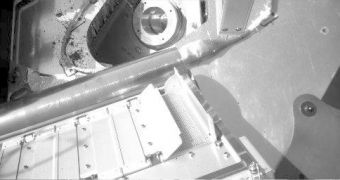The mission controllers of NASA's Phoenix Mars Lander decided to delay the beginning of the digging operations for a day in order to better learn how to scoop samples of soil from the Martian surface. The lander was scheduled to start gathering soil sample for analysis today, but they decided that Phoenix must first carry out a test in which a scoop full of dust is delivered to the Thermal and Evolved Gas Analyzer.
The spacecraft first dug into the plains of the northern regions of the Red Planet last weekend, as the malfunction of the TEGA instrument was sorted out. TEGA will receive samples of the Martian soil via the robotic arm of the Phoenix lander. The instrument basically consists of eight sample analyzer slots that can be used only once.
"When we deliver our first sample to TEGA, we want to be absolutely sure that we have what we want and deliver it properly", said chief scientist Peter Smith of the University of Arizona, during the press conference yesterday.
Smith said that he enjoyed commanding the spacecraft currently at a distance of 275 million kilometers away from Earth, but he admits it was not an easy task.
"It's really tricky because you have to give them all the steps and you can't quite tell what they're doing. We tell the arm what it needs to think about and where the surface is and what motor motion it has to do to get there, but it's only six or eight hours later that we see what it's done", he said.
The Phoenix Mars Lander touched down on the Red Planet on May 25 after a 9 month journey and has a mission scheduled for 90 days, during which time it must determine whether or not there is water ice in the landing area and if the clime could have made the planet hospitable for life.

 14 DAY TRIAL //
14 DAY TRIAL //